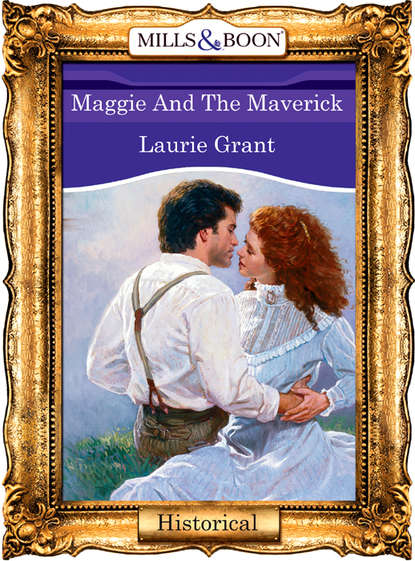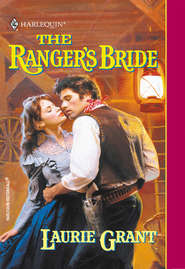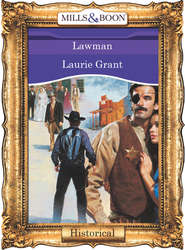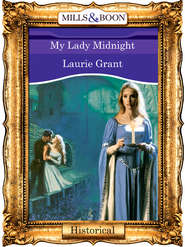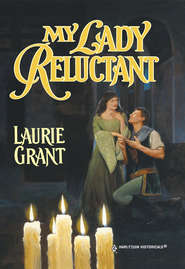По всем вопросам обращайтесь на: info@litportal.ru
(©) 2003-2024.
✖
Maggie And The Maverick
Настройки чтения
Размер шрифта
Высота строк
Поля
And then she was alone with Devlin.
“Well, now you have two males in your thrall, my son and Sweeney,” commented Devlin sourly behind her. “Stop batting your eyelashes and take your bags on upstairs, if you’re still determined to room there. Change into something you won’t be afraid to get ink on, Miss Harper.”
“I’m sure I don’t know what you mean, Mr. Devlin,” she retorted with some spirit. “But never mind—I promise never to bat my eyelashes in your direction. Give me five minutes to change my clothes and I’ll be back, ready to work,” she said. Picking up her two heavy carpetbags, she headed for the stairs. She hoped five minutes would be long enough to cool both their tempers so that they could get some work done!
The room was small, and sparsely furnished with a bedstead, a chest of drawers, holding a washbasin and pitcher, and a table with a single, rickety-legged chair. A cloudy mirror hung above the chest. There was one window, which looked out over a back street lined with small houses, some of which were little more than rude shacks. Not exactly a scenic view, she thought. She would need to fashion some curtains for privacy at night. And no doubt the room, which was now delightfully airy with the spring breeze blowing through the open window, would be hot as Hades come summer, but at least it was hers alone.
Latching the door behind her, Maggie set her bags down on the bed and pulled out her workday clothes, a skirt and waist of a navy blue so dark it looked black except in bright sunlight. It had been washed and re-dyed many times, but ink stains hardly showed on it. Then, staying away from the window, she stripped off her traveling clothes and hung them on pegs on the back of the door. There would be time later to arrange her garments in the chest of drawers.
Some thoughtful soul—impossible to think it could have been Devlin—had put water into the pitcher, and she poured some onto a towel and used it to wash her face. Feeling refreshed, she combed out her hair and braided the fiery, curly strands.
Garrick Devlin could hardly be more different from the kindly, middle-aged man she had imagined, Maggie thought as she coiled the braid at the nape of her neck with a few hairpins. She had been expecting someone like her father, she realized, someone with James Harper’s gentle mien if not his looks.
She estimated Garrick Devlin to be anywhere from his mid-thirties to forty years of age, judging by the lines engraved around his eyes and mouth and the silver mixed into his dark hair. But his cynical, touchy disposition might make him seem older than he truly was. His face was a lean, hawkish one, with high cheekbones, a long, wellshaped nose and narrow eyes of that piercing blue that seemed an echo of the Texas skies. There was an impossibly arrogant set to his mouth that belied the weakness suggested by the cane he kept at his side.
All told, it was a stubborn, disagreeable face, at least when he looked at her—and yet she had seen that face change when he talked to Johnny. She had seen that he could smile, and that his smile transformed the rest of his tense features, relaxing them and making him look years younger and much more approachable—even handsome! she was surprised to realize.
Well, she had no further use for handsome, that was cer tain. All she hoped for was to be able to work with this difficult man to produce a newspaper they could both be proud of. She could teach him much, if he would let her. If only his stiff-necked pride didn’t get in the way! It wouldn’t be easy, since he despised what she was and everything she stood for, but she could at least try.
Goodness, she’d better stop pondering over her employer and get back downstairs! It was surely more like ten or fifteen minutes since she’d come up here!
“Took you long enough,” groused Devlin, barely glancing up as she reached the bottom of the stairs. He was hunched over the table, a stubby pencil grasped in his right hand, and as she approached, she saw that he’d already covered nearly a full page with his untidy scrawl. She saw him stop and glance at the telegraph transcription, and then his pencil began to race over the paper again.
“I’m sorry, sir, I—”
“Here,” he said, thrusting the now-filled sheet of paper at her. “You can start setting the type for this page.”
The first thing she was going to have to learn how to do was read his writing, Maggie thought with dismay as she peered at the slanting scrawl. It was nothing like the neat copperplate of his letter to “M. L. Harper.” Had he gotten the local schoolmarm to write that letter for him?
“What’s wrong?” he demanded, peering at her and letting the pencil fall with a soft clatter to the desk. “Are you disagreeing with my headline story already? I didn’t employ you to pass judgment on my opinions, Miss Harper, I pay you to run the press,” he growled.
“No, Mr. Devlin,” she began, “that is, I don’t know if I disagree. I—I’m not used to your writing as yet. But just give me a minute or two, and let me study it. I’ll ask you if I can’t decipher a particular word,” she promised, evad ing the hand that would have snatched the paper back from her.
Sure enough, once read in the light of the window, the individual letters began to sort themselves out and form into words and phrases, though it was particularly tough to tell one vowel from another, for they all appeared to be the same indistinct near-loop shape. Hopefully the arrangement of his flamboyantly slanted consonants would give her the clues she needed.
She turned her attention to the California type cases, the trays of metal letters of various sizes and fonts. At least the standard nine-point type she’d need for the newspaper was arranged alphabetically, she discovered. When she had more time she would arrange it the way compositors traditionally did—capital letters alphabetically in cases on the right, and small-case letters on the left, with the most frequently used ones in the handiest spaces.
She began setting up the rows of type that would become the opening lines of the infant newspaper: the masthead, with the large Gothic capitals proudly proclaiming the name of the paper as the Gillespie Springs Gazette; the motto Forever The Truth For Texas right underneath; and then the date April 4, 1869, followed by the words Premier Edition and Garrick Devlin, Editor And Owner.
That portion completed, she laid out the very first headline: Radical Republicans Choose E. J. Davis As Their Gubernatorial Candidate, Former Union Brigadier General Is Certain Victor With General Reynolds As Ally.
Afternoon drifted into evening as she painstakingly set in rows of metal and wood type the words Garrick Devlin was feverishly scribbling at his desk. Every so often he would hand her another page and ask her how she was coming, and if she thought she was going to be able to finish tonight. Naturally, she could not lay out the pages as fast as he could write, but she kept working, ignoring the ache in her back and the throbbing of her head.
“Well, are you going to tell me we shall have to put off publication for another day?” Garrick Devlin inquired some time much later, coming to stand next to where she was working on the second page.
Maggie looked up in surprise. “Why, no, sir,” she said, glancing at the watch she’d pinned to her bodice. Seven o’clock, and she was only half done! “No, I promised you this would be ready by morning, and it will be, even if I have to stay up all night, just as I said.”
Was that approval that had flashed so briefly in those cold blue eyes? No, surely she had imagined it!
“Well, Miss Harper, I am all done with the writing, and my stomach is growling.”
“Go ahead, go have something to eat,” she said without looking up. “I’m not hungry after that big midday dinner,” she lied. And then, to her mortification, her own stomach protested, too, loudly enough that Garrick Devlin heard it.
“Why, Miss Harper, I believe you are prevaricating,” Devlin mocked, a small smile playing about that arrogant mouth.
“Well, perhaps a little,” she admitted, “but I really am eager to get this done, just as I promised. Perhaps I will eat something before we start running off copies.” She’d need some nourishment before lifting those heavy trays of type and repeatedly pulling back the devil’s tail—the lever that rolled the bed of type under the platen.
“Then I shall have to go over to the hotel and purchase something for both of us to eat, or no doubt I’d return to find you swooned on top of the press,” he taunted her in that molasses drawl of his.
“It’s not necessary.”
“Certainly it is. I promised Jovita I would feed you, and so I shall. I, Miss Harper, do not prevaricate. I’ll return in a few minutes.” With that, he made his way to the door and went out.
Chapter Six (#ulink_d2e6ca63-6318-5874-a46e-b8a719ab4e53)
Garrick peered at his pocket watch, willed to him as the eldest Devlin son by his father. It was 3:00 a.m.
“One hundred copies,” he murmured as Margaret Harper pulled the last one off of the press. “I believe that will be enough for our first edition, Miss Harper, so I’ll bid you good-night.”
She stared back at him as if dazed, her green eyes dull with fatigue, her shoulders slumping slightly, and he knew a moment’s shame for having worked her so hard on the same day she had arrived on the stage. As soon as he’d finished writing the copy, he’d helped with as much of the work as he could, and bad been shocked by how heavy the typeset pages were once the tin letters were locked together. Why, they must weigh a good thirty pounds each, and Miss Harper hadn’t even mentioned it, let alone batted her eyelashes at him and praised his manly strength the way Cecilia used to do when she wanted something heavy toted for her.
Then, after some quick instruction by Miss Harper, he’d done the tedious “pulling of the devil’s tail” and run off copies of the Gazette while she belatedly ate her supper. His right shoulder throbbed as a result, and he marveled that she, of much slighter build, had yet to utter a first complaint.
Perhaps the Yankees were built of sterner stuff than he’d imagined. “You’ve worked very hard today, Miss Harper. That is to be commended,” he said. “If it hadn’t been for that story, of course, we needn’t have been in such a hurry, but this information can’t wait. Naturally I shan’t expect such a frantic pace out of you normally.”
He saw her chin go up again, the shoulders straighten and the light of battle rekindle those green eyes.
“Nonsense, Mr. Devlin,” she said briskly. “Every good newspaperman—or woman—thrives on the excitement of getting such a big story to its readers. Don’t fear you have to spare me just because I’m a woman. I’m used to working as hard as any man.”
He knew a grudging admiration for her stubbornness. Fine—if she wouldn’t complain, he’d be damned if he’d let on how much he hurt.
“Well and good, Miss Harper, but surely you had better retire for the night. It will be morning before you know it, and we’ll need to start planning the next edition.”
“Oh…oh, of course,” she murmured, as she turned and walked toward the stairs. “Good night, sir.”
She hesitated as she passed the remains of their hurried supper lying on the table, the grease-stained brown paper wrapping and a piece of crust from a steak sandwich. “I-I’ll just clean this up before I go upstairs, Mr. Devlin.”
“Never mind, Miss Harper, I’ll dispose of it,” he said firmly.
“Very well. Good night, then, Mr. Devlin.” He heard her trudge up the stairs, pull the creaky door open—he’d have to oil that hinge, he thought—and shut the door quietly behind her. A moment later an audible click announced that she’d locked the door from the inside.
He turned and surveyed the pristine black-and-white stack of papers. The ink still gleamed wetly on the top copy. Each one was a big sheet of paper folded in half, forming four pages filled top to bottom with his eloquent reporting of the story from Austin and his opinions about it. In just hours the townspeople would eagerly snatch copies from that stack, and his career as the respected editor of the Gillespie Springs Gazette would officially begin.
The moment seemed incomplete to Garrick. If his new employee had been a man, as he’d been expecting, he would have invited him to share in a celebratory glass of whiskey. He’d stashed a bottle in his desk for just such an occasion as this, the completion of the very first issue of the town’s first newspaper. But of course one did not invite a lady—or even a presumptuous Yankee woman such as Margaret Harper—to share a drink.
The only sort of female who drank liquor was a sporting woman, and he did not associate with those, even when his long-frustrated sexual needs clamored for satisfaction. No, he wouldn’t pay for what passed as loving, knowing that if he did find a woman who would provide such services to a cripple, she’d either charge him double or do it out of pity, then laugh about it later with her sisters in the oldest profession.
There was no help for it—he’d have to drink alone, he mused, retrieving the whiskey bottle and a glass from the desk drawer and pouring himself a two-finger measure. The amber liquid burned a fiery path down his throat and hit his stomach like a glowing ember.





